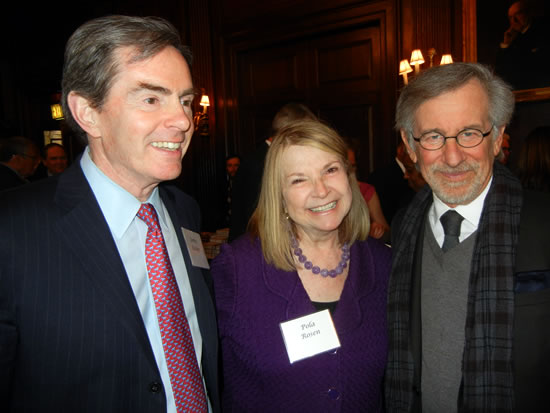Stephen Spielberg Celebrates Lincoln with the Gilder-Lehrman Institute
By Danielle M. Bennett

(L-R) Professor James Basker, President, Gilder Lehrman Institute, Dr. Pola Rosen, Stephen Spielberg
From July 1-4, 1963, the most important battle of America’s Civil War History was fought—a battle that left approximately 51,000 American casualties bonded by the sense of freedom, but divided over the meaning of that very same principle. It was the Battle of Gettysburg and a little over 150 years later, its significance prevails among scholarly discussions, in journals and even in institutions of higher learning. The leader of the Union Army and the country’s Commander-in-Chief, Abraham Lincoln, is still revered today, not only for his leadership in that battle and war, but for the words he spoke to commemorate those lives sacrificed on that massive battlefield in Pennsylvania.
This year, two scholars received the coveted prize named in Lincoln’s honor. The Lincoln Prize, awarded by Gettysburg College and the Gilder Lehrman Institute of American History in New York, went to professors, Dr. Allen C. Guelzo and Dr. Martin J. Johnson. It was Guelzo’s third prize win, and both Guelzo and Johnson received $25,000 and a bronze replica of Augustus Saint-Gaudens’s life-size bust, “Lincoln the Man.” Both Guelzo, a Henry R. Luce professor of the Civil War Era and director of Civil War studies at Gettysburg College, and Johnson, assistant professor of history at Miami University Hamilton, humbly accepted the award before a crowd of academics and journalists gathered at the Union League Club in New York.
Richard Gilder and Lewis Lehrman, both businessmen and philanthropists, co-founded the Gilder Lehrman Institute of American History in New York in 1994 and amassed the Gilder Lehrman Collection, one of the largest of historical national documents and artifacts privately owned. The Institute is dedicated to history education and lends support to teacher training and professional development, curriculum development, exhibitions, publications, history theme schools and the History Teacher of the Year Award program. Along with Prof. Gabor Boritt, director emeritus of the Civil War Institute at Gettysburg College, Gilder and Lehrman awarded an estimate $1 million to Lincoln Prize winners, since the prize’s inception in 1990. The award is given annually.
Guelzo received the honor for his book “Gettysburg: The Last Invasion (Alfred A. Knopf, 2013). “Gettysburg” recaptures the Battle of Gettysburg while also depicting the circumstances of war and society beyond the battlefield. Gilder introduced Guelzo, describing Guelzo’s book as “well worth the read.”
“I am as much of a surprise to myself tonight as the Lincoln prize is to me,” said Guelzo, during his acceptance speech. Guelzo was born in Yokohama, Japan, and not of “academic estate,” he said; but instead, Guelzo grew up as the grandson of a paper hanger and the son of a father who left the family when Guelzo was just 10 and who remained absent from Guelzo’s life for 30 years.
Such circumstance gave Guelzo a keen perspective about life. Guelzo underscored the importance of providing all people a fair chance in the race of life. Near the end of his speech, Guelzo asked that the prize not honor him; but rather, Lincoln and the men who fought at Gettysburg.
Johnson’s book, “Writing The Gettysburg Address” (University Press of Kansas, 2013) analyzed and explored the emotional and personal journey Lincoln experienced while writing the speech. Lehrman called it “a masterpiece of modern scholarship” in Johnson’s introduction. He also said that Johnson produced a very clear narrative about the speech and through Johnson’s study, readers got to learn the brilliance, poetry and divine quality of Lincoln’s words.
According to Johnson, the speech was not an “off-the-cuff” creation from Lincoln’s mind but a pensive process that drastically evolved after Lincoln visited the Gettysburg battlefield. After Lincoln’s visit, he understood more deeply the dedication of the soldiers who fought there and the last, handwritten revisions of the speech became the words we know well today.
Although Lincoln penned the infamous speech, Johnson said, “We created the Gettysburg Address as a nation, as a people-our celebration of its ideas.”
In addition to the prize winners, Academy award-winning filmmaker and cinema storyteller, Steven Spielberg, who was in attendance, received the Special Achievement Award for his 2012 release of “Lincoln,” which grossed over $275 million worldwide and receive two Academy Awards with one going to lead actor, Daniel Day-Lewis, his third Oscar win. “Lincoln” was based on Doris Kearns Goodwin’s “Team of Rivals” and Tony Kushner’s screenplay.
When accepting the award, Spielberg humbly declared that he is not a writer.#
